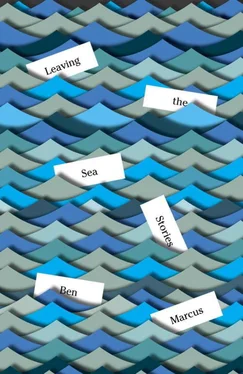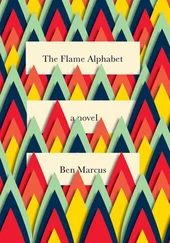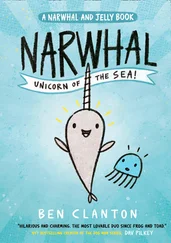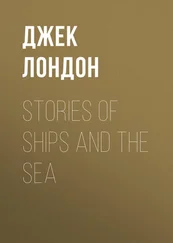It was late morning and the air in the Moors might as well have been brown. Soon there would be seizures of lunching erupting in the soft spots, bursts of solitary and group eaters from Crawford, their faces glazed with fatigue. Chances were that some colleagues would flood the Moors with their wilderness sounds and smells, blocking Thomas’s path back to his desk. Which meant that Thomas was pinned down, in military terms, between the Moors and his work space. Hadn’t he read that there were always nine ways to escape a trap? Was it nine? Did they all involve death, or was it just most of them? Maybe this had only been in a novel, though. Someone had dreamed this into being— Nine Ways to Escape Anything —and now people like Thomas had to suffer by wishing it was true. What good did that do anyone?
Just then the colleague stepped to the cart with a little squeal of pleasure, and Thomas felt nearly sucked into the space she had vacated. Her special noise—colleague noise number nineteen, probably—was the workaday exhaust of a body in search of drink, the kind of natural acoustic shedding that apparently emanates from people when they pursue their biological needs alone. It is only in company— Look out, shame! —that we become quiet. Not so the colleague, whose chirping whoop could be, if Thomas only had the technique and speed, rejoined with some equally guttural and possibly joyous chest noise.
Thomas had to wonder if this was how it worked in zoos, when a gang of beasts was suddenly shrieking together, dry humping the scratching post, doing flips around the pen. As a boy, standing in front of the oval domes that held such gorgeous creatures, Thomas always felt that the animals had noticed him and were calling him out, in their berserk fashion, and it didn’t seem to be his imagination that the shrieking subsided into hushed tones of relief when he walked away from them. Such power he had. He used to give the matter a lot of thought, because there was time then to worry about how much he sickened those who saw him, and on his most rational days it was clear that his body itself was triggering a frenzy in animals and humans alike, with removal the only solution to hand. I’m walking away so that you might calm down, which was something, come to think of it, he often had to say to his own child in present times. But elsewhere, when he indulged the need to argue for his own survival, he had to concede that there was a chance, however slight, that the animals, in shrieking and howling and tearing at their own skins, were, in their special way, approving of him, welcoming him, possibly even inviting him into their midst. Was this another missed opportunity he was supposed to be worrying about now?
No one was waiting behind him in the Moors, so the protocol now was unclear. If he moved forward to fill the colleague’s space, advancing in the queue, not that there was legitimately a queue, it would leverage direct pressure on the colleague, encouraging haste and reminding her that someone else loomed . He thought of those times in banks when he walked into the lobby and people seemed suspended in place, as though they had forgotten what they were doing. My friends, the puppets, he wanted to say. These people were not clearly in a line, though, nor were they distant enough from the line to seem unaffiliated with it. Menacing business. Artists of affiliation, they should be called. It took talent to make everyone around you start to worry and second-guess their most basic goals. (He saw himself—handsomer, thinner, slightly girlish—at a podium, holding an audience of animals in thrall with his lecture: In my work, I explore the confusion that results when physical-proximity laws are stretched beyond the breaking point. I seek to destabilize normative pedestrian traffic and queuing strategies by engaging unresolved coordinates with my physical form and holding fucking fast until someone wants to kill me. The setting for this work is the bank or the store, our shared spaces, where I will cause people to ask fundamental questions about my coordinates. ) These hovering people required to be questioned on the matter; they were asking to be addressed— ask me where I stand! —and Thomas knew that, no matter what, he did not want to be questioned on this or really any other matter. A credo! Fend off inquiry. How much simpler could it be? One’s actions should prevent all approaches . Why weren’t there needlepoint frames for that?
How soon could Thomas move after the colleague moved, and would that not trigger a complaint on her part? I have the right not to be imitated . Behavioral goddamn copyright, right ? Yet he was distant enough from the cart, if he didn’t shadow the colleague, and indeed from anything in the Moors, that it might appear to a newcomer—please God forbid there ever be a newcomer—death to the newcomer!—that he was not waiting in line, but loitering in the center of the Moors with some arcane religious purpose in mind. Or not even arcane. This is a man, others might argue, who is about to sacrifice a child on a pyre. Grab him now before he strikes his match.
Unclaimed space might have been making this worse. The Moors had never developed a specific use by the lab, which was funny when you thought of it, since wasn’t every cubicle acre everywhere else at Crawford Labs fought over by every spazmodia he worked with? They were like Sooners, or Okies, or… Thomas paused as a smile flushed into his face, the sort of smile that required a hand to squeeze down… Jews.
He shot a look around the Moors because this was the kind of thought that would seem so, who knows, detectable . You don’t just think something like that and not show the whole known world what you’re made of. These thoughts steam off of your head, they’re inhaled by everyone around you. He knew that they weren’t Jews, and yet, calling up in his mind the sweaty-headed figurines who passed for his co-employees, the people who might meatily regard him if he ever held the floor (in the contest that had come to be known as Speak Well or Be Killed) and served up a passable, even yeoman performance, he wished he had the sort of acquaintances who would swallow this whole: pretending that the Sooners were Jews and that the Jews had a head start on the Homestead Act, tearing through the dust bowl and planting flags, erecting shtetls, bursting with song as the sun went down on the freaking veld. Was it a veld then, or did velds come later, or from elsewhere?
Standing in the Moors, the whole image—people, his people? stampeding over unclaimed land, a thunder of Jews—turned oily in his head, and it was good riddance. Acquaintances were precisely the people who cold-warred you when you ventured something borderline. This wasn’t Jew hating, he protested to no one, this was Jew loving, loving the Jew so heartily that you sent him into the past to accomplish great things and save lives. Go forward, or backward, young Jew! But tell that to the acquaintances. Acquaintances operated a bellows that blew over you a cloud of reeking air. To the Jews he knew, Thomas was not really Jewish, and yet to the non-Jews he sure as hell was as Jewish as it ever could possibly get. He had pegged the needle. What was this zone of belongingness called, other than stage three alienation? In their minds, the non-Jews bearded Thomas and gowned him and maybe also had their disgusting way with him on an old abandoned couch in the desert. How many times had others imagined killing him, he wondered, and was there possibly a critical mass at work, where technical death occurred if your death was dreamed of by enough people? Had this colleague killed Thomas in her mind? Chances were. Or who knew, but couldn’t the possibility of his wished-for death account in some way for the unusually cold, blue, rigid way he felt? You’re killing me, he wanted to say to her. In your mind, I can feel it .
Читать дальше












